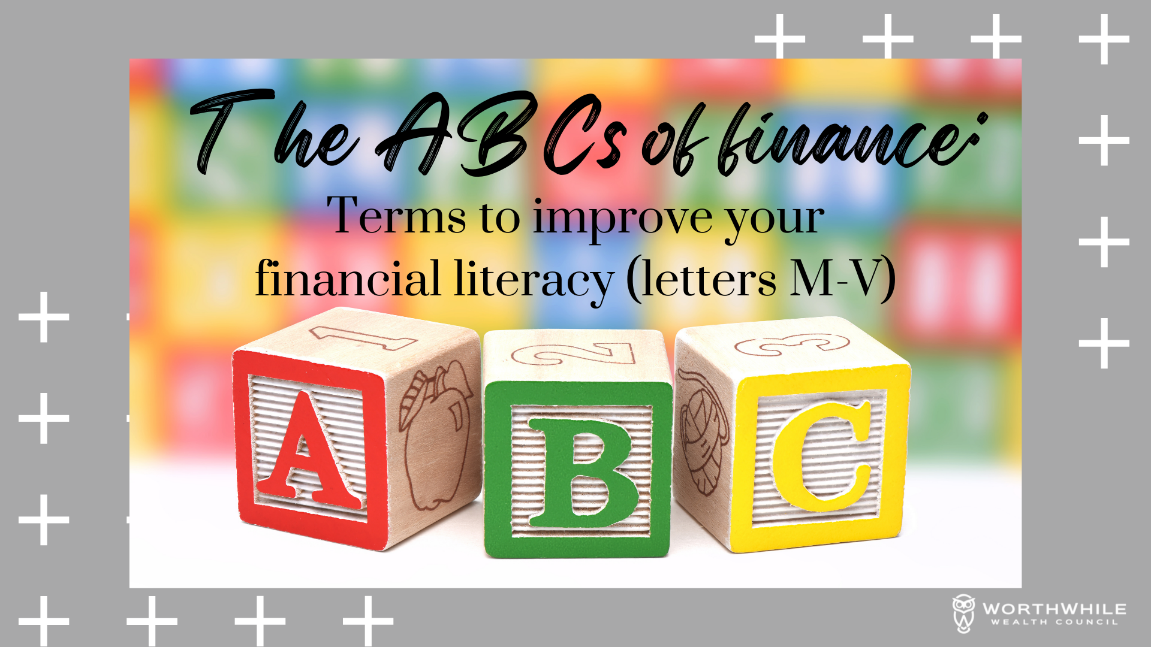Staying up-to-date on your financial terms is no easy task. There are so many words to keep track of, it’s almost impossible to keep it all organized. Here are a few definitions from the second half of the alphabet to add to your finance tool belt. If you missed A – L check out our previous blogs!
Market value: The price a given asset would earn in the marketplace if offered for sale. Market value is largely influenced by the business cycle, and it can fluctuate a great deal over time.
Maturity: The period of time when a financial investment, such as an insurance policy or security, or a loan, reaches an end. When it reaches maturity, the financial instrument no longer exists after it is repaid with interest.
Money market account: An account that often pays higher interest than a typical savings account, but does allow the ability to write checks. It usually limits the number of checks an account holder can write during a specified period of time. Money market accounts are FDIC-insured account and has the benefits of both checking and savings accounts but likely requires a higher balance.
Municipal bond: A debt security issued by a local authority, such as the state, county or municipality, to finance capital expenditures like road construction, bridges and schools. Municipal bonds are exempt from most taxes, especially if you live in the state in which the bond is issued.
Net income: A company’s total profit, which is calculated by subtracting the costs of business from total revenues. This helps measure the company’s profitability over a period of time. Net income may also refer to an individual’s income after tax and pre-tax deductions, such as employer-funded health insurance or a 401(k) deduction has been subtracted. Net income may also be known as “take-home” pay since it is the amount of pay an individual actually receives in their paycheck or direct deposit.
Net worth: The key measure of how much an individual or business is worth. Consistently increasing net worth signifies good financial health.
Options: A representation of a contract sold from one party to another. A call option gives the option holder the chance to buy a security at a certain price. A put option gives the option to sell at a certain price.
Principal balance: The balance on a loan or mortgage that remains to be paid, not including interest or any other charges.
Roth IRA: A type of retirement account that allows a person to set aside income after-tax. After the Roth has been funded for 5 years AND you reach 59 1/2 years of age, earnings on a Roth IRA and withdrawals are tax-free. Your financial adviser can explain the different retirement account options.
Routing number: A numerical code that identifies a bank or financial institution to both clear funds and process checks. This number normally appears on a check, and specifies the bank that holds the account from which the funds should be drawn.
Terms: Refers to the lifespan of any investment. For a loan, the term refers to the time it takes for the borrower to make all payments back to the lender.
Traditional IRA: The traditional retirement account to which an individual can make pretax contributions toward investment and allow them to grow tax-deferred. Depending on your income and tax-filing status, these contributions may be tax-deductible.
Savings account: A bank account that allows your savings to grow at a moderate interest rate. Savings accounts often place a limit on the number of transfers and withdrawals you can make.
Stock: Represents ownership in a corporation or claim on a part of its assets and earnings. If you own stock in a company, you are a shareholder. For example, if a company has 5,000 shares of outstanding stock and you own 50 shares, you have a claim to 10% of the company’s assets.
Variable rate: An interest rate that changes or fluctuates over time. Variable rates are based on a benchmark interest rate that shifts periodically. If the underlying interest rises, your interest payment also rises. If the underlying interest rate falls, your interest payment falls, too.
This commentary was originally posted by Kasasa June 1, 2022
Source: https://www.kasasa.com/blog/personal-finance/personal-finance-glossary-m-v
**Disclaimer: This material has been prepared for informational purposes only, and is not intended to provide, and should not be relied on for, tax, legal or accounting advice. You should consult your own tax, legal and accounting advisors before engaging in any transaction.


